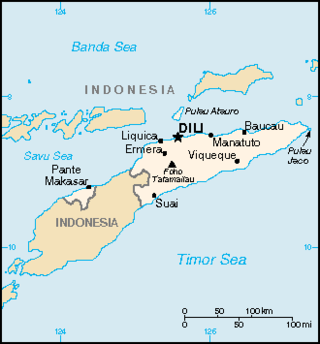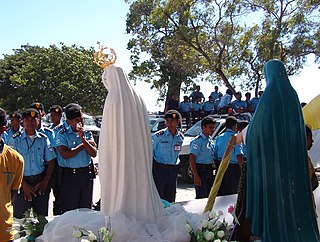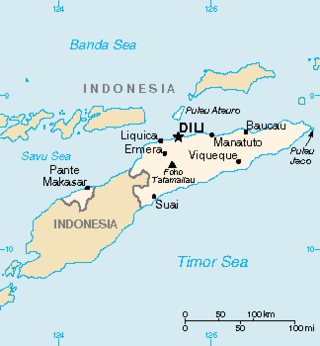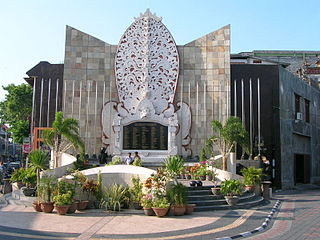A United Nations General Assembly resolution is a decision or declaration voted on by all member states of the United Nations in the General Assembly.
United Nations Security Council Resolution 27 was adopted on 1 August 1947. The Council called for a ceasefire and a peaceful resolution between the parties from the Netherlands and Indonesia involved in the Indonesian National Revolution.
United Nations Security Council Resolution 30 was adopted by on 25 August 1947. The parties from the Netherlands and Indonesia involved in the Indonesian National Revolution agreed to comply with Resolution 27. The Council requested that each member recall a diplomatic officer from Batavia for briefings on the situation.
United Nations Security Council Resolution 31 was adopted on 25 August 1947. The Council formed a committee to assist in the peaceful resolution of the Indonesian National Revolution.
United Nations Security Council Resolution 36, adopted on November 1, 1947, noted that according to a report by the Consular Commission, no attempt has been made by either side in the Indonesian National Revolution to come to compliance with United Nations Security Council Resolution 27. The resolution called upon the parties concerned to take action to bring the resolution into effect.
United Nations Security Council Resolution 41, adopted on February 28, 1948, commended both parties in the Indonesian National Revolution for the recent signing of a truce and attempts to comply with United Nations Security Council Resolution 27, repeated the offer of mediation made in United Nations Security Council Resolution 31, and requested the Committee of Good Offices keep them informed as to the progress of political settlement in the Indonesia.
United Nations Security Council Resolution 55, adopted on July 29, 1948, having receiving a report from the Committee of Good Offices about a standstill in political and trade negotiations in Indonesia, the Council called upon the governments of the Netherlands and the Republic of Indonesia to maintain strict observance of both the military and economic elements of the Renville Agreement and to implement early and fully its twelve political principles.
United Nations Security Council Resolution 63, adopted on December 24, 1948, in response to a report by the Committee of Good Offices the Council called upon the parties to cease hostilities and to release the President of the Republic of Indonesia and other political prisoners arrested since December 18, 1948.
United Nations Security Council Resolution 67, adopted on January 28, 1949, satisfied that both parties in the Indonesian Conflict continued to adhere to the principles of the Renville Agreement, the Council called upon the Netherlands to immediately discontinue all military operations and upon the Indonesian Republic to order its armed adherents to cease guerrilla warfare and for both parties to cooperate in the restoration of peace and the maintenance of law and order throughout the area. The Council further called upon the Netherlands to release all political prisoners arrested since December 17, 1948 and to facilitate the immediate return of officials of the Government of the Republic of Indonesia to Jogjakarta and afford to them such facilities as may reasonably be required by that Government for its effective functioning in that area.

United Nations Security Council Resolution 389, adopted on April 22, 1976, reaffirmed the right of the people of East Timor to self-determination. The Council called upon all states to respect the territorial integrity of East Timor and upon the Government of Indonesia to withdraw all of its forces from the Territory. The Resolution then asks the Secretary-General to have his Special Representative pursue consultations with the parties concerned and that the Secretary-General follow the implementation of the resolution and submit a report to the Council as soon as possible. The Council goes on to call upon all states and parties to cooperate fully with the United Nations to achieve a peaceful solution and facilitate the decolonization of the territory.
The official languages of the United Nations are the six languages used in United Nations (UN) meetings and in which the UN writes all its official documents.

United Nations Security Council resolution 1236, adopted unanimously on 7 May 1999, after recalling previous resolutions on East Timor including 384 (1975) and 389 (1976), the Council welcomed an agreement between Indonesia and Portugal on the future of East Timor and a proposed United Nations presence to assist with the East Timor Special Autonomy Referendum scheduled for August 1999.
United Nations Security Council resolution 1246, adopted unanimously on 11 June 1999, after recalling previous resolutions on East Timor, particularly Resolution 1236 (1999), the council established the United Nations Mission in East Timor (UNAMET) to organise and conduct the East Timor Special Autonomy Referendum on the future status of East Timor, scheduled for August 1999.

United Nations Security Council resolution 1262, adopted unanimously on 27 August 1999, after recalling previous resolutions on East Timor, particularly resolutions 1246 (1999) and 1257 (1999), the Council extended the mandate of the United Nations Mission in East Timor (UNAMET) until 30 November 1999.
United Nations Security Council resolution 1264, adopted unanimously on 15 September 1999, after recalling previous resolutions on East Timor (Timor-Leste), the Council authorised the establishment of the multinational International Force for East Timor (INTERFET) to restore peace and security in the territory, facilitate humanitarian assistance and protect the United Nations Mission in East Timor (UNAMET).

United Nations Security Council resolution 1392, adopted unanimously on 31 January 2002, after recalling previous resolutions on East Timor (Timor-Leste), particularly resolutions 1272 (1999) and 1338 (2001), the Council extended the mandate of the United Nations Transitional Administration in East Timor (UNTAET) until 20 May 2002.

United Nations Security Council Resolution 1438, adopted unanimously on 14 October 2002, after reaffirming the principles of the United Nations Charter and Resolution 1373 (2001), the Council condemned the bombings in Bali, Indonesia.

United Nations Security Council resolution 1480, adopted unanimously on 19 May 2003, after reaffirming previous resolutions on East Timor (Timor-Leste), particularly resolutions 1410 (2002) and 1473 (2003), the council extended the mandate of the United Nations Mission of Support to East Timor (UNMISET) for a period of twelve months until 19 May 2004.
Events in the year 1947 in Indonesia. The country had an estimated population of 71,460,600 people.

United Nations Security Council Resolution 2623 called for the eleventh emergency special session of the United Nations General Assembly on the subject of the 2022 Russian invasion of Ukraine. Albania and the United States introduced the resolution before the United Nations Security Council, which adopted it on 27 February 2022. Russia voted against while China, India and the United Arab Emirates abstained. As this was a procedural resolution, no permanent member could exercise their veto power.






